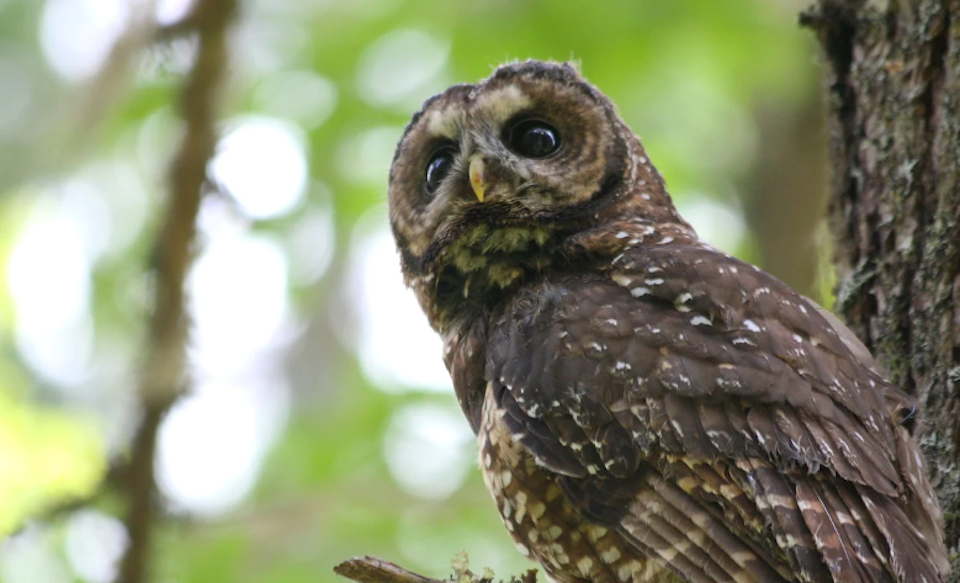The fate of Canada’s most endangered bird hung in the balance at a Vancouver federal court Wednesday as lawyers argued over how long the country’s environment minister could wait before calling on government to protect the habitat of critically endangered species.
The case revolves around the northern spotted owl, which was once thought to boast 500 breeding pairs throughout southwestern B.C. Today, only one wild-born individual remains in a small patch of old-growth forest in the Fraser Canyon.
On Wednesday, federal lawyers defended Minister Steven Guilbeault for waiting eight months to recommend an emergency order to cabinet under the country’s Species at Risk Act (SARA). The recommendation sought to protect more than 2,500 hectares of habitat slated for logging between April and November 2023.
Guilbeault agreed to make an emergency order recommendation to protect a swath of the owls’ habitat in January 2023. At the time, ministry staff said the order was necessary because, if logging continued through November, the survival and recovery of the species was “highly unlikely,” state documents.
But that recommendation to cabinet wasn’t made until eight months later, when it was revealed federal cabinet had rejected Guilbeault's recommendation.
Over that time, the court heard that the B.C. Minister of Forests Nathan Cullen sent a seven-page letter to the federal environment minister, arguing logging was not the only cause of the spotted owls’ decline.
Environment and Climate Change Canada lawyer Aileen Jones argued Guilbeault acted “reasonably” and did not “unlawfully delay” his duties under SARA. She said the recovery of the spotted owl would require the B.C. government take active steps within its jurisdiction.
“Cabinet is going to want information about efforts to collaborate with B.C.,” Jones told the court, explaining the delay.
Spô'zêm First Nation Chief James Hobart said he worried those conversations cost the spotted owl precious time.
“This politics is overriding the science of the discussion, and it shouldn't be that way,” said Hobart outside the court, pointing to a rising number of other species facing similar risks.
“We were basically diluting the definition of emergency right here and we should be strengthening that definition.”
Delay leads to a ‘talk and log’ approach, says environmental group
By June, the delay prompted the Western Canada Wilderness Committee to file a request for judicial review, challenging the ministry over its delay and calling on the federal court to declare it “unlawful.”
Between January and June 2023, the environmental group said it had documented that the B.C. government had approved for logging at least 468 hectares of old-growth forest — forest the group said overlaps with critical spotted owl habitat.
A week before ministry lawyers were set to face the Wilderness Committee in a Vancouver courthouse, a letter from Environment and Climate Change Canada to the Spô'zêm First Nation indicated Guilbeault had finally made the emergency order recommendation but that cabinet had turned it down.
The environmental group said it was moving ahead with its case so an environment minister can’t delay an emergency order recommendation again.
“Us getting a favourable ruling in this case, six months from now or longer, it's not going to bring back the habitat that was destroyed this spring and summer,” said Torrance Coste, the Wilderness Committee’s national campaign director.
“But it hopefully will set a precedent that when the federal environment minister is considering something like an emergency order, he takes into account that this is a dire situation and eight-month delay isn't appropriate.”
Consultation shouldn't get in the way of an emergency, group argues
Kegan Pepper-Smith, a lawyer with the firm Ecojustice representing the environmental group, argued in court Wednesday that the eight-month wait was the latest in a series of delays — part of a “talk and log approach” that has failed to protect the owl.
Pepper-Smith said successive ministers refused to take necessary action to protect the owl, even through it was listed under SARA 20 years ago. Those delays included not following through on several emergency order recommendations and failing to finalize a recovery strategy for the owl that remains unfinished.
Justice Yvan Roy questioned the lawyer over Canada’s obligation to consult provinces and First Nations, and carry out a socio-economic analysis before recommending an emergency order to cabinet — something that could take months.
Pepper-Smith submitted that those steps can occur at the ministerial level, as long as they don’t undermine the minister’s “core and sole obligation” under SARA: to issue an emergency order when an endangered species faces an imminent threat and before that threat materializes.
He said it doesn’t require a drawn-out consultation with B.C.’s forestry minister while the province approves logging in owl habitat.
“Here we have a political minister saying I disagree with your science-based assessment,” Pepper-Smith told the court, referring to Cullen's correspondence with Guilbeault.
“The first steps should have been: get the recommendation to cabinet… instead of sitting on the recommendation for eight months.”
The justice, who challenged lawyers on both sides throughout the proceedings, left the government’s lawyers with the task of explaining why it took Guilbeault so long to make his recommendation and how the delay fit within the law.
“The impression that one has is eight months? When you have one individual left in the wild? That catches the attention of people,” said Roy.
Government lawyers are scheduled to continue their submissions Thursday morning.




